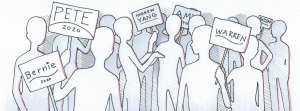Get Rid of Caucuses
February 10, 2020
The Iowa caucus occurred on Monday, and from the beginning organizers attempted to convince caucus goers that the process had been streamlined, and would occur more smoothly and quicker than past years. Caucus cards would provide a paper trail in case of errors, and voters would only be required to stay at the caucus site for the first round of grouping if their candidate was viable. However, after heading home and looking at returns, I and everyone else realized that this was sadly not true: the Iowa caucuses were, once again, a voting debacle. An app–which many precinct leaders had not been trained how to use–malfunctioned, and Iowans were left to wait for results for another 24 hours.
The Iowa caucus and its first-in-the-nation status have been an important facet of the nomination process since the 1800’s, when the caucus system was first developed. Originally deemed a “gathering of neighbors,” the caucuses were a chance for those still undecided about which candidate to choose to deliberate about policy, values, and match-ups against the opposite party’s candidate(s). Delegates for each respective candidate would be given half an hour to try and convince their neighbors of the merit of their chosen candidate. At the conclusion of this attempt at persuasion, final decisions would be made, and caucus-goers would group themselves by candidate for counting.
This process of counting is where the fundamental issue of caucuses arises. For many precincts, caucusing locations can house over a thousand voters—all in one room. Not only does the combined body heat push already pent up voters to greater anger at their disagreeing party members, the counting and recounting of moving people can take multiple hours. At the conclusion of the caucus, those who decided to participate often feel bitter at the wasted hours they spent casting a single vote. Furthermore, the time spent in the stifling and muggy heat of high school gyms could’ve been spent completing the duties imperative to many families’ smooth functioning.
The counting aspect of caucuses also entirely rules out absentee voting. In turn, this completely eliminates the possibility of another demographic exercising their right to vote: those working night shifts. Unable to spend three hours voting when their livelihood and job is at stake, many choose to skip their local caucuses entirely. It is unfair to rule out a group of people who often represent low-paying jobs; this only plays into the Iowa caucuses’ faux sense of representing the nation’s vote. These reductions in potential voters have a tangible effect: in the 2016 election, Iowans caucused at a rate of only 15.7 percent among all eligible voters. This is almost half of the countrywide primary voting rate, which stood at 28.5 percent.
Caucusing is not without its benefits. The discussion aspect, although incredibly time-consuming, is a fundamental aspect of democracy which dates back to the governmental form’s conception in the pillared floors of Ancient Greece’s legislature. Some voters are not exposed to different viewpoints due to the confirmation bias they unknowingly perpetrate within their daily lives, and can radically change their choice in candidates in minutes. Based on the new information each candidates’ delegate can provide, many important decisions can be made: only 40% of caucusgoers have made up their mind about their preferred candidate when arriving at their caucusing location. Talking to people around us about issues personal to us, which we often neglect, contributes greatly to the scope of our political understanding. We are all living in the same country, and deliberation can be an invaluable step towards understanding issues which aren’t within our own lives.
Despite these improvements, primaries’ convenience and their ability to allow a much greater pool of prospective voters to participate in their constitutionally given right make them the superior voting method. Increasing voter turnout to its maximum is vastly more representative of a true democracy, and should not be supplanted by conversations that are more often arguments than the eureka moments some caucusing proponents claim them to be. While last-minute information can be incredibly important, it is our duty to make decisions based on our ability to appraise candidates based on the information we have dutifully gathered over the months before the caucuses, not frantic vote persuasion within the “undecided” section of each respective caucusing location.
The abysmal voter turnout and inefficiency of caucusing cannot be ignored. Too many Iowans are immediately left out of the process, and votes are invalidated before they could ever be cast. The counting process is unnecessarily slow and creates strife about the invaluable power we carry to cast our votes for the candidate we believe is best suited to win the general election. The Iowa caucuses should be switched to a primary, as it would enable the most democratic appointment of the Iowan people’s most popular candidate.

































